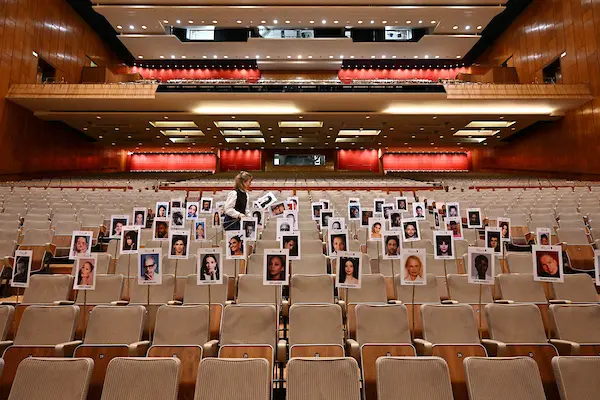- Over 120 wide-ranging changes introduced to urgently address a lack of diversity in the BAFTA Awards
- Significant changes in acting, directing & Outstanding British Film categories to be introduced from Film Awards 2021
- BAFTA commits to long-term substantial cultural and organisational change
The British Academy of Film & Television Arts today announced over 120 wide-ranging changes to its voting, membership and campaigning processes as it published the findings of its in-depth, independently verified seven-month Awards Review.
The Review began as a direct response to the lack of diversity in the 2020 Film Awards nominations, but its remit soon expanded to encompass all aspects of BAFTA and its awards.
The changes, which have been unanimously approved by the BAFTA Board, signal the beginning of a significant cultural shift in BAFTA as it also challenges the industry to address the serious lack of opportunity and equality.
Key changes include:
Membership
- An unprecedented expansion to further diversify BAFTA’s membership and meaningfully target 1,000 new members from underrepresented groups
- Membership survey to be sent out later this month – completion is a requirement for voting – to allow BAFTA to set targets to address areas of under-representation
- Clearer contextualisation of ‘Excellence’ in reference to BAFTA’s mission and other measures for voting members will be put in place to ensure an informed voting process
EE British Academy Film Awards 2021
- A new longlisting Round of voting in all categories to achieve greater diversity in nominations
- It is now compulsory for all voters, chapters and juries to watch all longlisted films before Round 2 voting, to level the playing field across all titles
- Major rule changes and increase in nominations in the acting and directing categories to address a continuing lack of diversity in the performance categories and a historic lack of female representation in the directing category
- Outstanding British Film – an increase to ten nominations to ensure a stronger focus on British film within the Film Awards and the ceremony itself
Changes to campaigning aimed at ensuring a fairer consideration of all films regardless of marketing budget - All entered films to be available on the new BAFTA View portal (with titles added over six months prior to the ceremony) to allow for better voter access to all entered films and wider viewership across all films
- BAFTA continues to endorse the BFI Diversity Standards as an effective tool for driving meaningful change in the industry, and will continue to work with the BFI to expand the use of the BFI Diversity Standards as eligibility criteria across a wider range of categories
- BAFTA is supporting the BFI’s review of the BFI Diversity Standards and its work with other UK partners, and with AMPAS, to strengthen and develop the framework for maximum impact
BAFTA Chair Krishnendu Majumdar, said: “This is a watershed moment for BAFTA. The Academy has never opened itself up like this before. The sessions with contributors were tough, chastening, captivating and very moving. Many colleagues from under-represented groups bravely shared their experiences of racism and discrimination in their careers. They also shared their ideas and hopes for BAFTA’s future, which we have embraced. There is a real wish and support for BAFTA to continue to be an industry leader on diversity and other issues. Representation matters and we’ve all been starkly reminded of this with the rise of the global anti-racist movement. This creative renewal is not just about changes to the awards and membership – this is a reappraisal of our values and the culture of BAFTA. We want long term and sustainable change throughout the industry. We know how far we have to go and how difficult this is especially due to the profound impact that the COVID-19 pandemic has had on our industry. Today’s announcement marks just the first phase of our process as we evolve as an Academy.”
BAFTA Film Committee Chair Marc Samuelson said: “It became very clear during the Review how vital it is to level the playing field across all that we do as an organisation, not just the awards. One of the key issues raised time and time again throughout the process was that too much deserving work was not being seen. The changes we are implementing are designed to ensure these films are seen and judged on merit alone. The ambition is for BAFTA to evolve into a more inclusive organisation, one representing and celebrating the full breadth of talent in our industries.”
BAFTA Chief Executive Amanda Berry OBE said: “I am incredibly grateful to the vast number of people who have given their time and shared their wisdom and experiences throughout the Review to help us determine what we can do better as an organisation. The ongoing passion and expertise of our members is the lifeblood of BAFTA and I am constantly inspired by their incredible contribution. The first phase of findings in our Review gives us a fantastic opportunity to build on BAFTA’s strong foundation, as we look to make substantial cultural and organisational change.”
The Review has been led by BAFTA Chair Krishnendu Majumdar, Film Committee Chair Marc Samuelson and a specially formed Steering Group. It was convened from all sectors of BAFTA as well as independent specialists drawn from the creative industries, other industries and diversity & inclusion experts. Its members include Chair of BAFTA LA and Head of TriStar Television Kathryn Busby, filmmaker and actor Noel Clarke, academic and co-founder of RizTest Sadia Habib, Film London’s Film & TV Executive/Founder of the Equal Access Network’s Nahrein Kemp, ITV Group Director of Diversity and Inclusion Ade Rawcliffe, the BFI’s Head of Inclusion Jennifer Smith and thinkBIGGER!’s Talent Manager and Disability Specialist Samantha Tatlow.
The Steering Group scrutinised all areas of BAFTA, with a particular focus on its Film Awards for changes in the first year. They spoke with over 400 people, including members, senior industry figures, guilds, industry bodies, currently under-represented groups, press and a significant number of prominent figures within all aspects of the filmmaking community in the UK, US and internationally.
Following the implementation of this first phase of the Review, the Steering Group will continue to meet quarterly to ensure change is being delivered swiftly and on a continuous basis. Several areas that require further examination/exploration include genderised performance categories and supporting D/deaf and disabled practitioners in order to find long-term and meaningful solutions to these important issues.
Significant changes to the Television Awards will also be announced next month, and separate Games and Children’s Awards Reviews are being conducted later this year.
About BAFTA
The British Academy of Film and Television Arts (BAFTA) is a world-leading independent arts charity that brings the very best work in film, games and television to public attention and supports the growth of creative talent in the UK and internationally. Through its Awards ceremonies and year-round programme of learning events and initiatives – which includes workshops, masterclasses, scholarships, lectures and mentoring schemes in the UK, USA and Asia – BAFTA identifies and celebrates excellence, discovers, inspires and nurtures new talent, and enables learning and creative collaboration.









